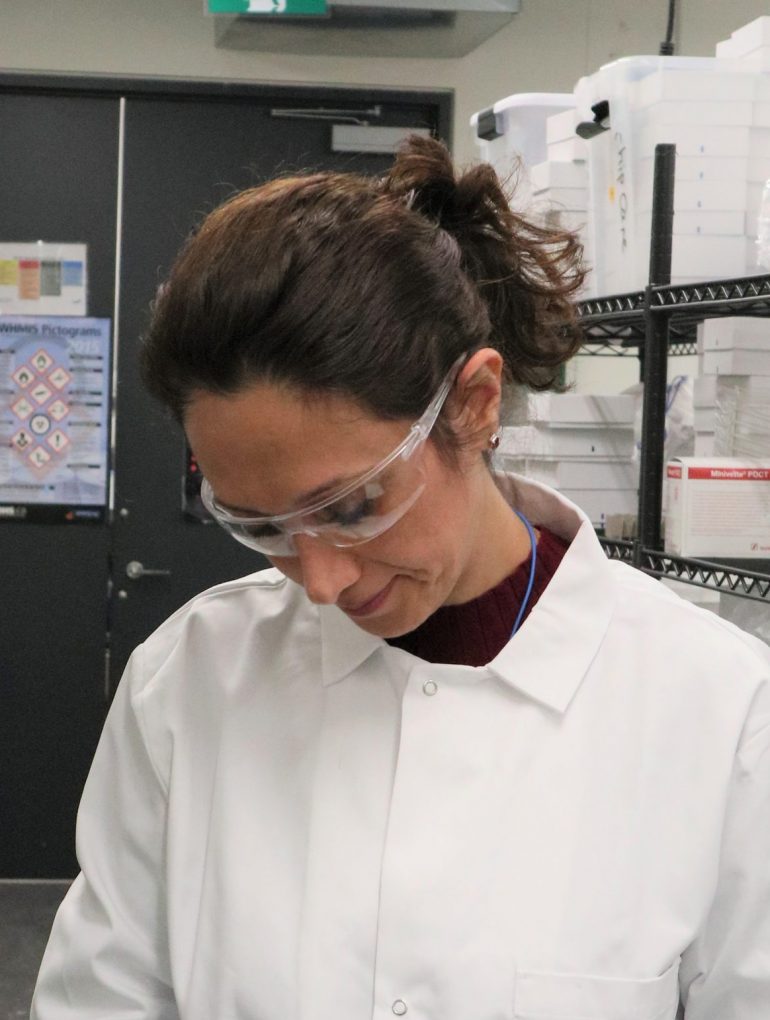
Zhamak Abdi began her academic career in Iran at Sharif University. She then started her first Masters of Science in Biological Physics at the University of Toronto (2009-2010) then continued afterward as a research assistant (2010-2011). Looking to fulfill her goal of entering the biomedical engineering space, she began a second Masters – also at the University of Toronto – in Applied Science in Biomedical Engineering (2011-2015). Zhamak is now a senior biomedical device engineer at ChipCare Corp., a Toronto-based start-up company which is developing accessible and affordable multiplex point-of-care diagnostics for sexually transmitted infections (STIs) and other infectious diseases.
What is your role at ChipCare?
My job, as a biomedical engineer at ChipCare, is to bridge the work done by the engineering team and the assay development team. I am responsible for defining our product’s system and design requirements and mapping out experiments to test the designs.
On a day-to-day basis, I am involved conceptualizing tests to ensure that the cartridges and instruments we use are within our defined requirements. This means I spend less time running tests in the lab and instead, lead a team of people in research and development who conduct the experimental tests. Very much like graduate school, literature search is still a big part of my day-to-day. This helps me to understand novel research so I can help our engineering team to find the right direction when we hit roadblocks and ultimately improve our approaches within our company.
Can you tell me about your academic path?
First, I finished my bachelor’s degree in the Physics program at Sharif University in Iran. Although my courses were specialized in atomic physics, my final-year research project explored biomedical applications of physics – mostly focused on lasers. After finishing my undergraduate degree, I started working and didn’t go back to school for a few years.
I moved to Canada and after a twelve years hiatus from academia, I decided to go back to school and continue my studies. I didn’t know much about biomedical engineering at first and didn’t feel it was likely that I would be able to go into the project I wanted to with my undergraduate experience since there was a big gap. So, I applied to the physics department at UofT with the intention of continuing into biomedical applications down the road. I started working with Dr. William Ryu and studied neuronal development and signaling in C. elegans using microfluidic devices.
Then I started in BME with Dr. Axel Guenther for a second master’s degree where I developed a Vein-On-A-Chip microfluidic platform to perform immunofluorescence staining on intact veins. The platform was a scalable experimental approach that allowed the structure and function of intact veins to be routinely assessed under near-physiological conditions. Such a platform can be used to improve understanding of infectious diseases and, ultimately, for the development of new anti-inflammatory compounds, as well as other products in the pharmaceutical industry.
What was your favourite part of graduate school?
I really enjoyed the student seminar sessions where graduate students would present research work from their group! It was fascinating to learn about all of the different research happening at the Biomedical Engineering, University of Toronto, and beyond.
In general, I very much liked the idea and existence of the collaborative programs in graduate school that help with further specializing degrees. I personally used this opportunity to direct my studies in physics towards a degree in biomedical engineering.
I also enjoying meeting and getting to know other students. The community in the graduate department of BME is special. Students, even from different groups, would come together and support each other to achieve personal and professional goals. People are willing to spend time and help you to learn and grow.
Do you have any advice on things I can do to make the most of my graduate school experiences at UofT?
I think it’s important to clearly understand why you are in graduate school and have an idea of what you would like to do afterwards. It can be beneficial to explore job fairs and job postings, so you have a feeling for what kinds of skills different companies are looking for and what types of roles are being offered. Different industries have different demands, and it is useful to be aware of these constant changes.
If you are interested in pursuing a career in industry, it may be helpful to take more applied courses. While I took some very useful theoretical courses, such as fluid mechanics, I think the more practical courses help people to develop skills you can market. I think it is also useful to pickup skills that are relevant to the type of work you plan on doing in the future. Generally, developing abilities in programming, project management and design seems to be useful.


